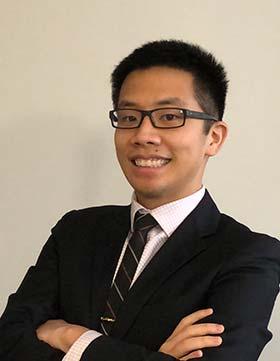
Matthew Ahn joins the CSU Cleveland-Marshall College of Law faculty this Fall as a Visiting Professor. Ahn, a graduate of the New York University School of Law, most recently served as a Research and Writing Attorney with the Federal Public Defender for the Northern District of Ohio. However, the law is just one of many passions for Ahn.
Professor Ahn is a trivia whiz who appeared on an episode of Jeopardy! while he was a law student. While Ahn did not win in his appearance, participating on the show was a once-in-a-lifetime experience. His trivia knowledge at the time was deep but not well-rounded and some of the categories he faced, including literature, film, art and world history, did not align with his strong suits. With that experience, Professor Ahn learned a lesson that he also applies to his legal work.
“One of the things (I learned from Jeopardy!) that’s helped me in my law practice is the understanding that as much as I will do my best in representing my client, I cannot control every aspect of the case as an advocate,” said Ahn. “Of course, the best advocates (and the best trivia champions) keep working on their own skills along the way.”
Ahn has also received notoriety as a transit enthusiast. He has twice held the Guinness World Record for the “Subway Challenge,” holding the fastest time to travel to all New York City Subway stations. The New York Times dubbed Ahn “King of the Subway,” in an article on the amazing feat.
Professor Ahn, a native of North Royalton, Ohio, originally developed his interest in transit as he learned the value and challenges of urban transit as an undergraduate student Case Western Reserve University. One of his most prized possessions is a framed print of a speculative Cleveland subway system he sketched out. Ahn notes that Northeast Ohio’s transit situation is difficult because of recent decentralized development that has made commuting patterns scattered to the point that creating a transit system to serve all regions is virtually impossible. He is currently working on a video series on the evolution of the Midwestern suburb that will explore some of these transit issues as they relate to redlining, housing equity, and displacement.
Cleveland has always been home for Ahn. A diehard Cleveland Browns fan, he once ranked all 186 losses the team suffered between 1999 and 2015 in an article highlighted by the Plain Dealer and Rolling Stone Magazine. He is excited that his first opportunity as a legal professor is in his hometown and at an institution know for its focus on social justice
“Cleveland-Marshall occupies an important space, as a smaller school that is structured to provide greater access to the legal profession,” said Ahn. “That access is a necessary part of a legal system that is built for justice rather than as a codification of social order. My research and teaching interests, which often try to parse the distinction between those two goals, is closely aligned with the goals and the purpose of the programs at Cleveland-Marshall.”
Ahn is currently working on an article for submission in the near future that discusses the faults of the “lodestar” method that most courts use to calculate attorneys’ fee awards. He argues that unpredictability and a lack of timeliness with these awards results in important constitutional cases often not being brought to court.
While this is Ahn’s first legal teaching position, he does have experience in the classroom. Ahn, who obtained a B.A. in Music Theory and a B.S in Chemistry from Case Western Reserve and an M.A. in Music Composition from the University of Minnesota, taught a History of Rock and Fundamentals of Music as a graduate instructor at Minnesota. While there might not seem to be many similarities between musical and legal studies, Ahn has found that is not the case.
“Much of the study of music composition is the study of organization and framing,” explained Ahn. “Your musical ideas are your own, but compositional skills are usually a matter of musical form. Legal writing and advocacy is often similar: you don’t have the power to change precedent, and while it is important to develop a favorable factual record, the actual facts are often beyond the control of the attorney. As a result, much of what we can identify in effective advocacy is thoughtful organizing and framing.”
Ahn later worked as a Math/Science Instructional Assistant at Cuyahoga Community College, where he taught and tutored low-income and first-generation college students who were struggling to pass their math and science requirements. It was during that experience when Ahn first considered the importance of teaching, as well as how the law might be a tool to changing the inequalities facing disadvantaged students.
Ahn will teach Civil Procedure, as well as Leg/Reg and/or Property at CSU C|M|LAW, in addition to serving as a resource on Critical Race Theory. Ahn learned about the concepts of Critical Race Theory (CRT) as a law student, in a Racial Justice and the Law course taught by Bryan Stevenson, founder and director of the Equal Justice Initiative.
“That class, which was historically grounded, turned my understanding of American history on its head,” explained Ahn. “As I moved into law practice, I started to see similar indications in my work. CRT ultimately gave me the vocabulary to express some of the unease I felt over time about the flaws in the systems I was working within, and if I noticed these inequities regularly, other lawyers are too.”
Ahn believes most common misperception of CRT is that it is a single theory that can be neatly summed up in a sound bite at all rather than a descriptor of a large variety of related ideas. He notes some scholars are interested in correcting the historical record about the development of U.S. law while others are interested in identifying social and political incentives for racial progress that are more complicated than the traditionally taught narrative.
